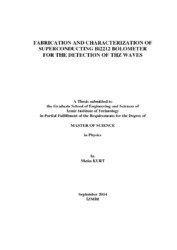Please use this identifier to cite or link to this item:
https://hdl.handle.net/11147/4304| Title: | Fabrication and characterization of superconducting Bi2212 bolometer for the detection of THz waves | Other Titles: | THz dalgalarının algılanması için süperiletken Bi2212 bolometrenin üeretimi ve karakterizasyonu | Authors: | Kurt, Metin | Advisors: | Aygün Özyüzer, Gülnur Özyüzer, Lütfi |
Keywords: | Terahertz (THz) waves Superconductors Bi2212 single crystal |
Publisher: | Izmir Institute of Technology | Source: | Kurt, M. (2014). Fabrication and characterization of superconducting Bi2212 bolometer for the detection of THz waves. Unpublished master's thesis, İzmir Institute of Technology, İzmir, Turkey | Abstract: | Since terahertz (THz) waves can pass through materials like clothing, plastic, wood, ceramic, leather and without harm to the body, it can be used for characterization, detection and 3D imaging of these materials. THz application area expands day by day such as high-speed wireless communications, medical imaging, security in airports and shopping centres and detection of chemical and biological materials. Rapidly increasing applications of the electromagnetic waves (EM) in the under developed terahertz frequency (0.1-10 THz) range requires a well understandings of efficient terahertz wave detection. An intense, coherent and continuous electromagnetic wave source is obtained by High-Tc superconductor Bi2Sr2CaCu2O8+δ (Bi2212) single crystal. At the same time Bi2212 single crystal can detect THz waves in suitable conditions. Nowadays, different types of bolometers are used for detection of THz waves. But they have many limitations like slow response time which is the most significant problem and costly cryogenic spending. In this study, single crystal of Bi2212 is cleaved to layer by layer by scotch tape until the necessary is reached thickness. Afterwards, it is pasted on a sapphire substrate and the scotch tape is etched with the aid of chloroform solution and ultrasonic cleaner. After the crystal fabrication, the exact thickness of the crystal were obtained using atomic force microscopy. Then, the samples were annealed at 400oC for 1 hour in order to adjust the oxygen doping level and then deposited with 150 nm Au layer by thermal evaporation. Afterwards they were annealed again at 425oC for 30 minutes to decrease the contact resistivity. After clean room process, our log-periodic antenna design was formed on the crystal by using e-beam lithography and Ar-ion beam etching step by step. Finally, four probe wires were connected to the two contact paths and log-periodic antenna by silver epoxy. The temperature dependence of a-b axis resistivity (R-T) for Bi2212 single crystals were performed. | Description: | Thesis (Master)--Izmir Institute of Technology, Physics, Izmir, 2014 Full text release delayed at author's request until 2017.10.30 Includes bibliographical references (leaves: 76-83) Text in English; Abstract: Turkish and English xii, 83 leaves |
URI: | http://hdl.handle.net/11147/4304 |
| Appears in Collections: | Master Degree / Yüksek Lisans Tezleri |
Files in This Item:
| File | Description | Size | Format | |
|---|---|---|---|---|
| T001328.pdf | MasterThesis | 3.64 MB | Adobe PDF |  View/Open |
CORE Recommender
Page view(s)
206
checked on Oct 14, 2024
Download(s)
102
checked on Oct 14, 2024
Google ScholarTM
Check
Items in GCRIS Repository are protected by copyright, with all rights reserved, unless otherwise indicated.